Lady Is Mad At Her Cousin For Letting Her Indoor Cat Out Without Telling Anyone Despite All The Warnings
Cats want to explore the "forest" outside, and this can be traced back to their ancient ancestors. But how safe is your feline buddy when left outside, whether they are ambling along a fence line, relaxing on a roof, scavenging for mice or birds, or roaming their always-expanding territory?
Cats have been spending more time indoors since the 1940s when kitty litter was invented. It's likely that you've heard people refer to their cats as "indoor" or "outdoor," which denotes whether they reside inside the house or are permitted to go outside.
Even though some cats might prefer being outside, keeping cats indoors is often safer. There are several risks involved when your favorite furry family member gets out.
A lot of people are unaware of the potential risks until it is too late. Fortunately for one Reddit user, it wasn’t too late for her pet.
The OP took to Reddit to share how her cousin snuck into her room and let out her cat. The OP’s aunt already has an adult cat who is an outdoor cat, and the OP’s cousin believes that it's "cruel" to keep a cat cooped up inside all day.
So when the OP went to classes, he let her cat out without telling anyone, but fortunately, her aunt found her in the backyard with the chickens.
The Headline...

The OP has a little black kitten who she has named Binx

She'll get jealous watching the older cat come and go as he pleases
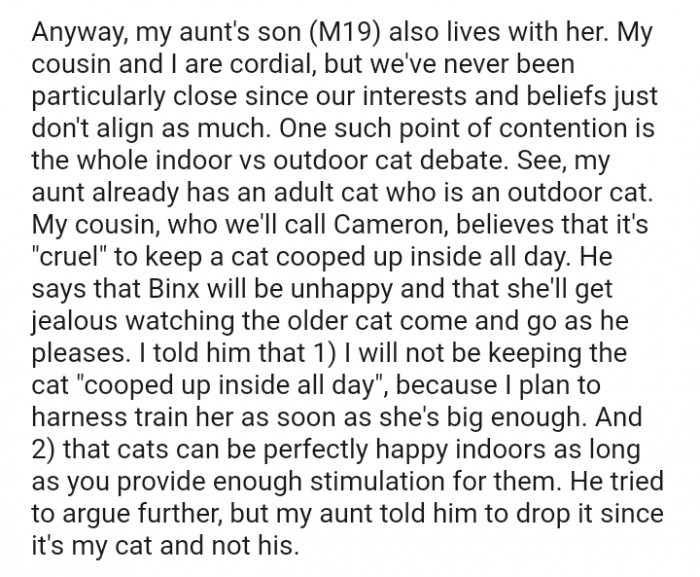
Navigating Responsibility and Trust
This scenario illustrates the delicate balance between responsibility and trust in interpersonal relationships. Dr. Claire Johnson, a psychologist focused on trust dynamics, notes that when individuals breach agreements, it can lead to feelings of betrayal and anxiety. In this case, the cousin's failure to communicate about the cat's outdoor activity may have violated the trust established in their relationship.
Research in relational psychology indicates that trust is a fundamental element in maintaining healthy relationships; breaches can lead to significant emotional distress and conflict. Understanding the emotional ramifications of such breaches can help both parties navigate their feelings more effectively.
Navigating Responsibility and Environmental Impact
The concern regarding the indoor cat's safety reflects broader themes of responsibility and environmental impact. Research by Dr. David Stern, an ecologist, highlights that outdoor cats can significantly impact local wildlife, leading to potential ecological imbalances. Understanding these implications can foster more responsible pet ownership and encourage individuals to consider the broader impact of their pets on the environment.
In this case, the cousin's decision to let the cat outside may reflect a lack of awareness regarding these responsibilities.
She told the OP she looked everywhere and couldn't find her
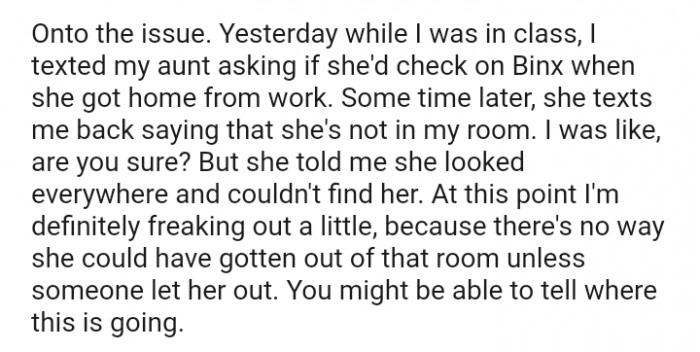
Binx is MY cat, so it's not his decision to make
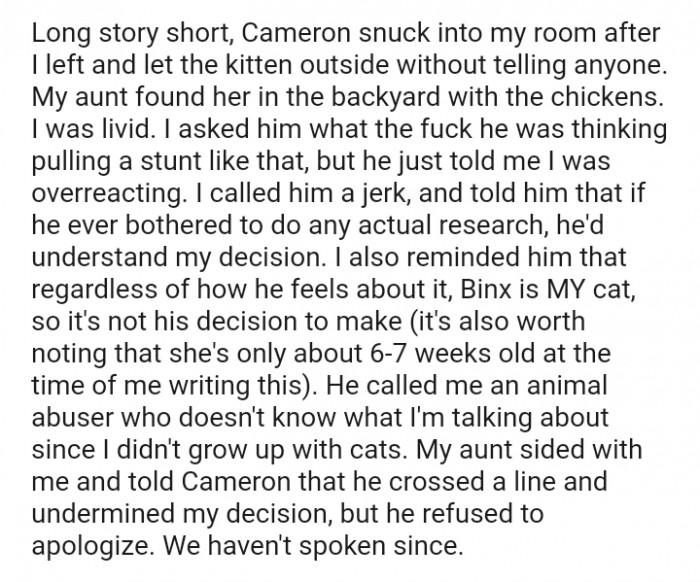
Redditors wasted no time in airing their opinions in the comments section, and here are a bunch of them below.
A real piece of work

Moreover, the concept of boundary-setting is crucial in this context. A family therapist emphasizes that clear boundaries regarding pet care and responsibilities can prevent misunderstandings and conflicts. In this situation, the cousin may have overstepped boundaries by allowing the cat outside without consulting others, which could lead to feelings of anxiety and loss for those concerned about the cat's safety.
Establishing clear expectations can create a more harmonious living environment and reduce the likelihood of similar conflicts arising in the future.
Emotional connections to pets can complicate decisions about their care. According to Dr. Julie Hecht, a researcher in animal behavior, individuals often struggle to balance their emotional desires with practical considerations regarding pet safety. A study published in the Journal of Animal Ethics indicates that pet owners frequently grapple with conflicting feelings about how best to care for their pets while also considering their responsibilities as caretakers.
Good for you for sticking up for your cat

This is simply animal abuse

Your cousin deliberately disregarded your wish
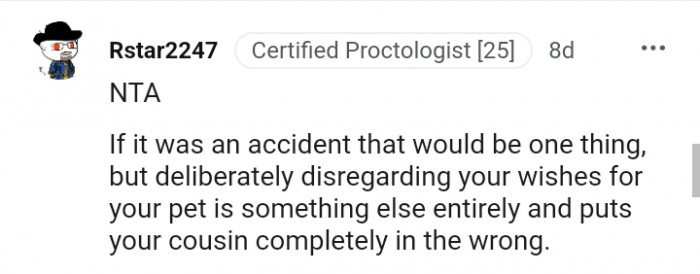
Emotional Reactions to Breaches of Trust
Breaches of trust often evoke strong emotional reactions, including anger and disappointment. Dr. Sarah Collins, a clinical psychologist, notes that these feelings can stem from an individual's attachment to the relationship and expectations of mutual respect. In this case, the upset lady likely felt her values regarding pet care were disrespected, leading to her frustration.
Research on emotional intelligence suggests that recognizing and validating these feelings can facilitate healthier discussions and conflict resolution.
The Role of Communication in Pet Care
Effective communication is essential in navigating disagreements over pet care decisions. Research from the University of Pennsylvania emphasizes that open dialogue can significantly reduce misunderstandings and foster collaboration in shared living situations. In this case, discussing the implications of allowing the cat outside could lead to a more balanced approach to pet care that respects both the cat's needs and the concerns of others in the household.
Encouraging a collaborative approach to pet ownership can lead to better outcomes for everyone involved.
She could have gotten lost, hurt, or worse

He thinks a little kitty can defend itself outdoors
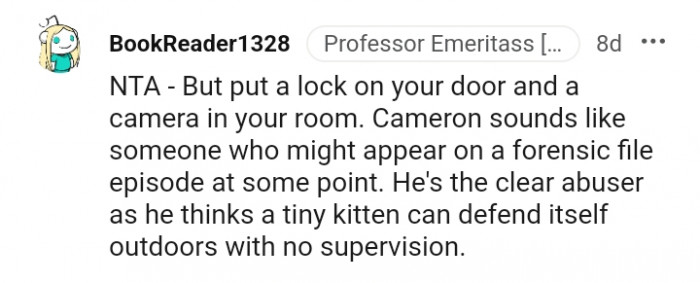
An indoor cat will live a much healthier and happier life
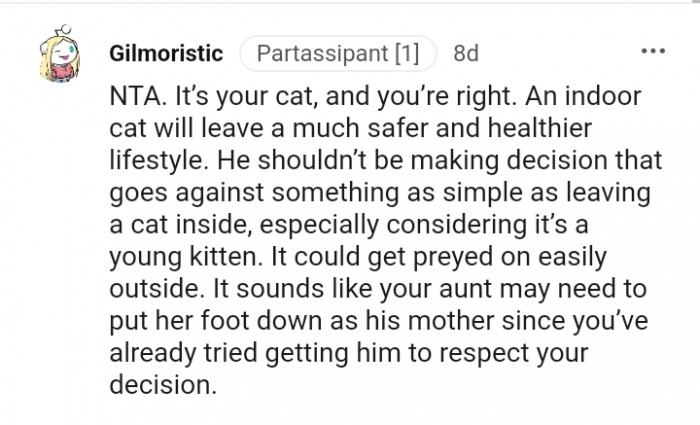
The Role of Communication in Resolving Conflict
Open communication is essential for resolving conflicts arising from breaches of trust. A communication expert emphasizes that discussing feelings and expectations can lead to greater understanding and collaboration. In this situation, having a candid conversation about the cousin's decision and its implications could help restore trust and clarify expectations moving forward.
Research indicates that effective communication can prevent misunderstandings and enhance relational satisfaction, making it a key component in resolving conflicts.
Promoting responsible pet ownership involves educating individuals about the potential risks and benefits of different care approaches. Engaging in discussions about the environmental impact of letting pets roam outside can help pet owners make informed decisions. Research indicates that providing pet owners with adequate information can lead to more responsible choices that reflect both their emotional connections and their responsibilities.
You said you would take them out on a leash
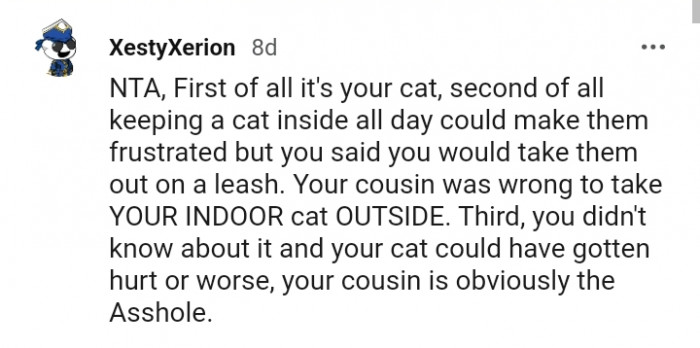
This Redditor prefers indoor cats as well
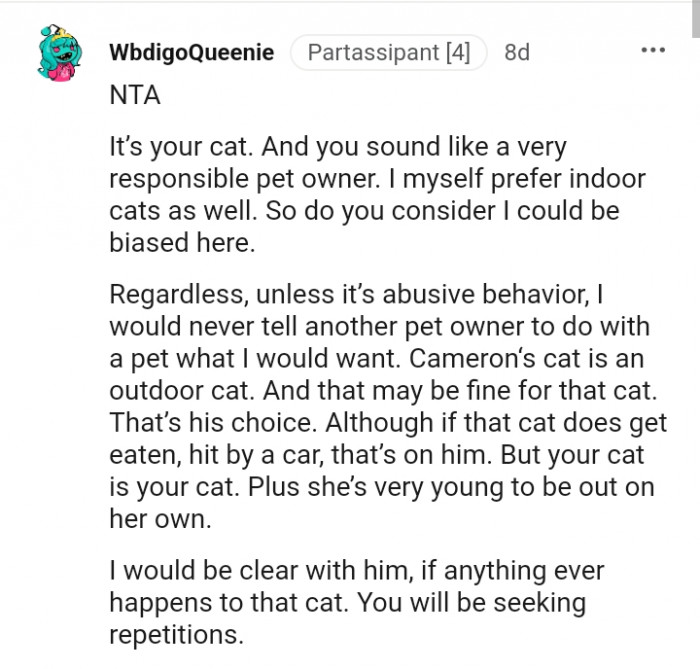
He decided to do whatever he wanted despite the OP making her point clear
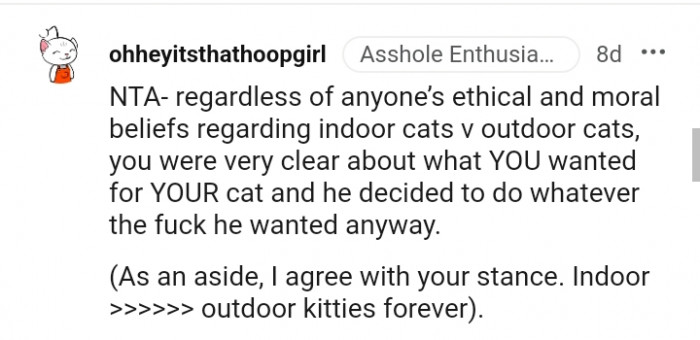
The Importance of Empathy
Empathy plays a vital role in conflict resolution, particularly in familial relationships. Dr. Emily Roberts, a psychologist specializing in family dynamics, notes that understanding each other's perspectives can foster compassion and reduce emotional distress. The upset lady might benefit from expressing her feelings while also considering her cousin's viewpoint, creating a space for mutual understanding.
Research indicates that empathetic communication can strengthen relationships and decrease conflict, leading to more positive outcomes for all parties involved.
Encouraging Responsible Pet Ownership
Fostering a sense of community around responsible pet ownership can enhance the well-being of both pets and the environment. According to Dr. Alan Beck, an expert in animal welfare, communities that engage in discussions about pet care and environmental stewardship create supportive networks for pet owners. This can lead to shared resources and information that promote responsible pet ownership practices.
In this case, encouraging discussions about the impacts of outdoor cats could promote a more informed and responsible approach to pet care.
He snuck into your room like that without consent
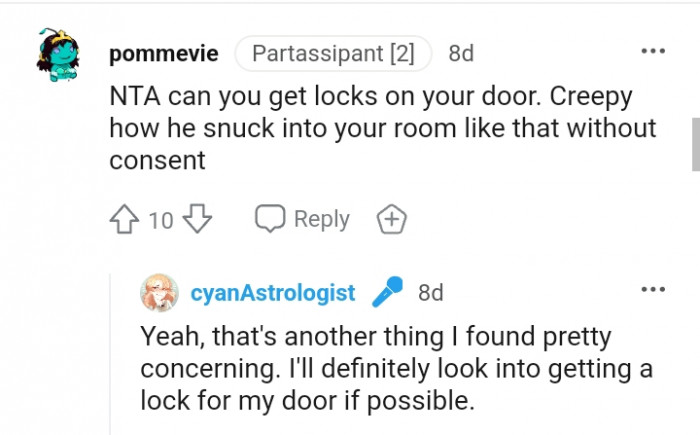
Such a young kitten should not be outside unattended
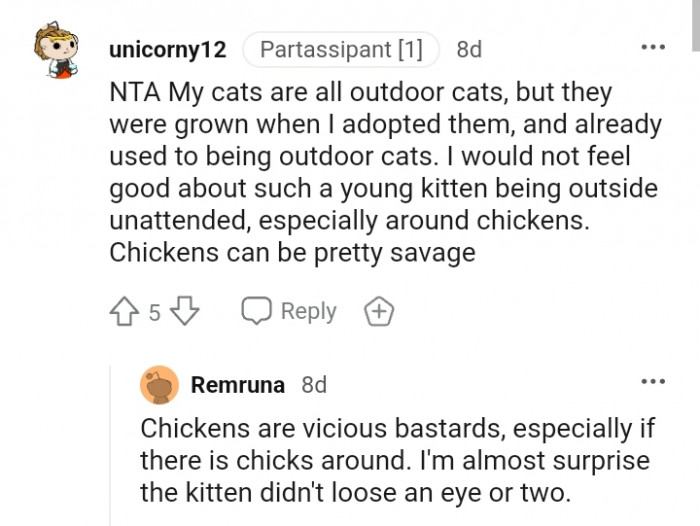
You can get her a safety collar in the meantime
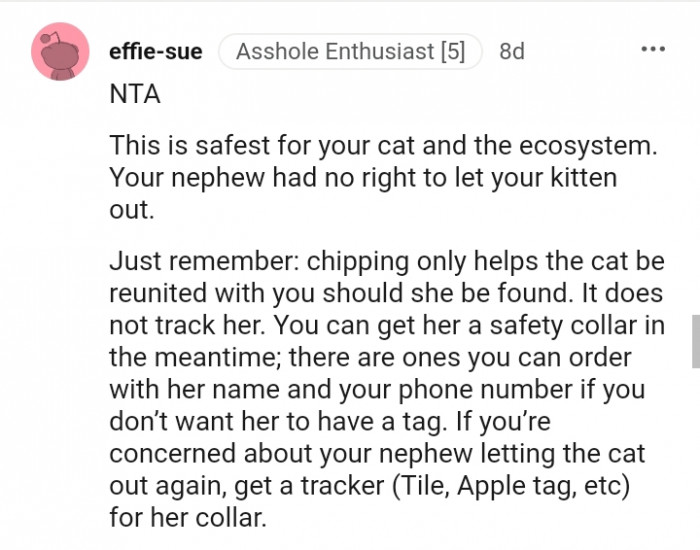
Finally, considering the long-term implications of unresolved conflicts is crucial. Research in developmental psychology suggests that unresolved issues can lead to ongoing relational difficulties, affecting emotional well-being in the long run. By addressing conflicts promptly and constructively, families can foster healthier dynamics and promote emotional resilience.
Encouraging open dialogues about responsibilities and feelings can create a supportive environment for all involved, ultimately strengthening familial bonds.
Ultimately, fostering awareness about pet care responsibilities is essential for both animals and the environment. Encouraging individuals to consider the broader implications of their pet ownership choices can lead to better outcomes for pets and wildlife alike. Research consistently supports the notion that informed pet ownership leads to healthier relationships and ecological sustainability.
To put an indoor cat like that outside is cruel
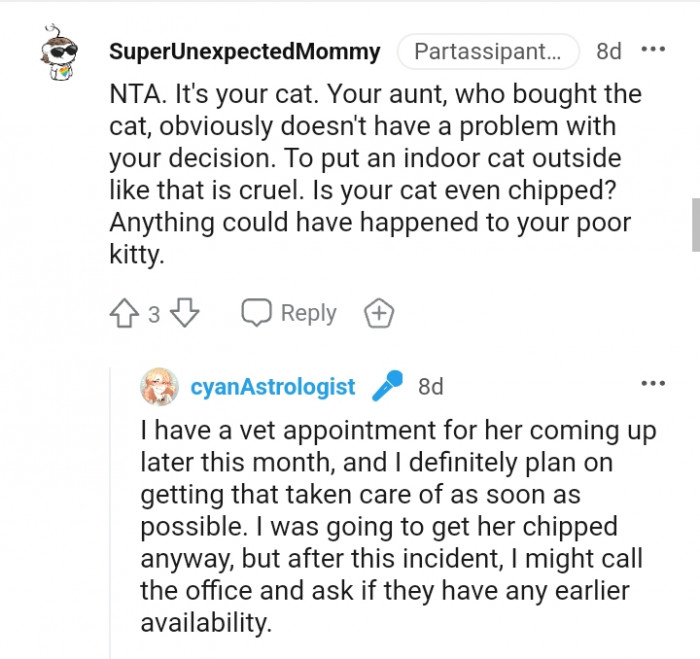
You clearly care about your cat and love her
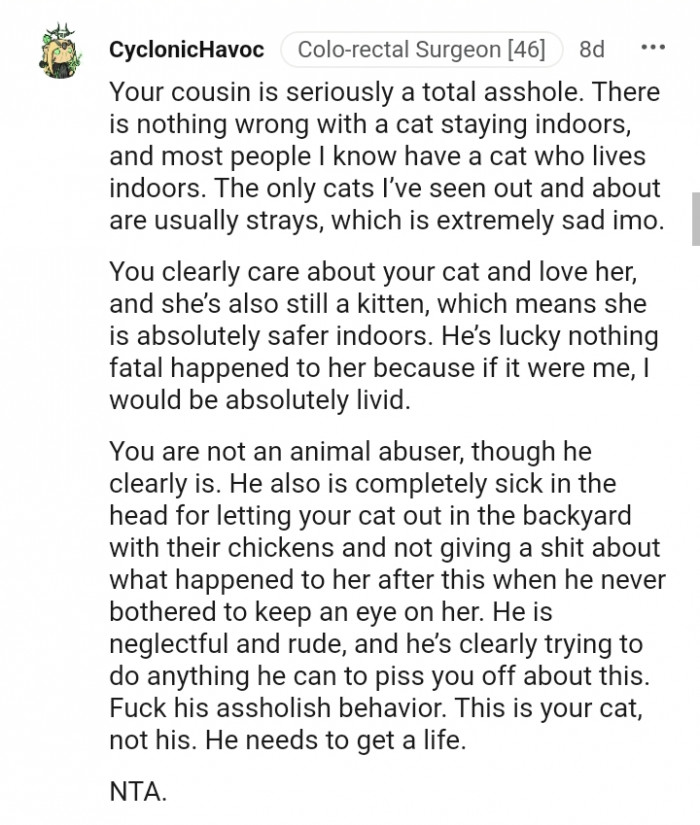
There has definitely been a dramatic shift since the OP arrived
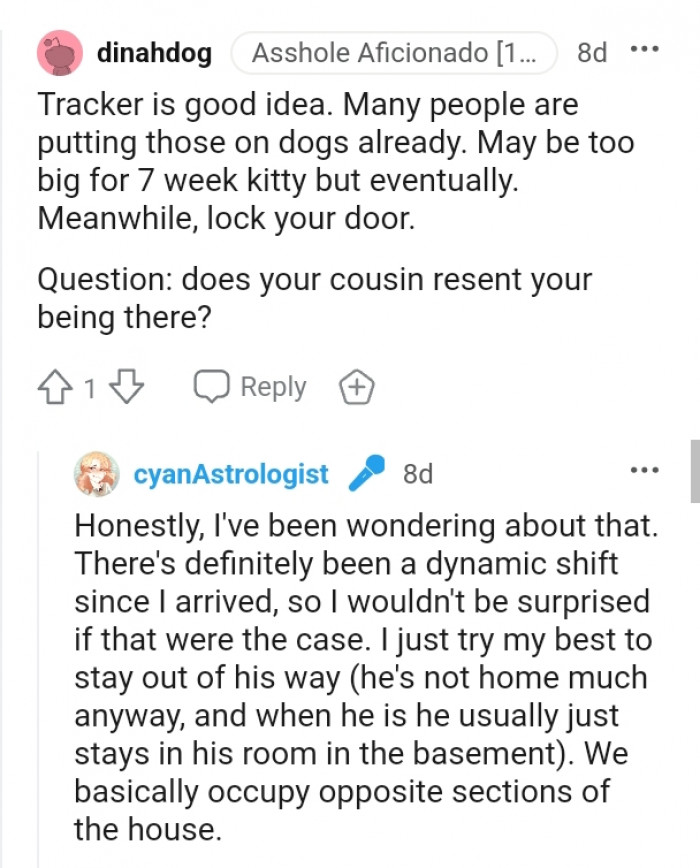
This Redditor's brother has lost three outdoor cats
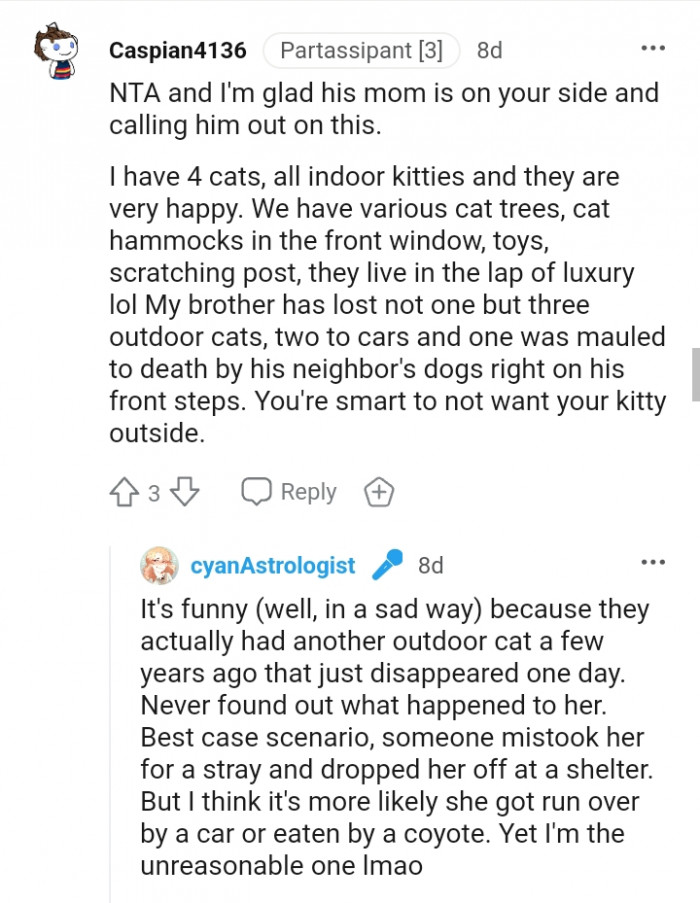
He shows only the most passing interest
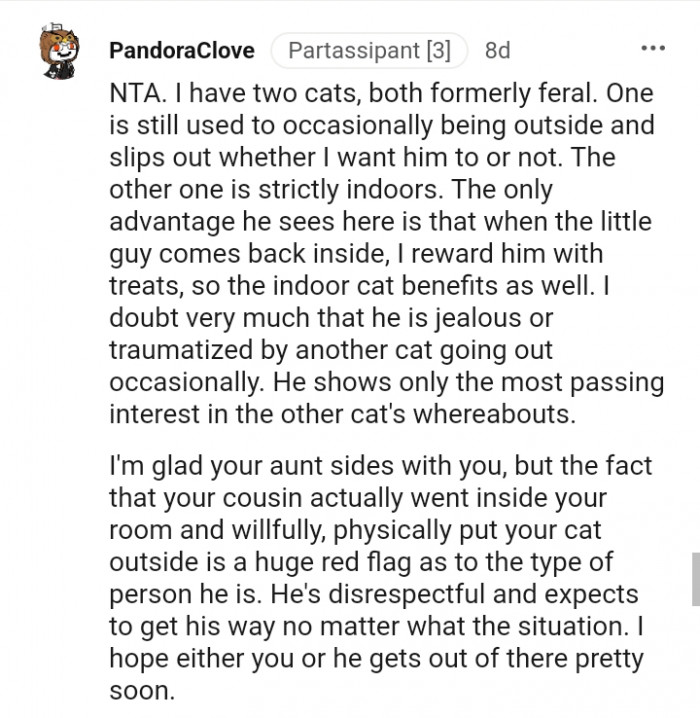
It is better to have cats as indoor pets
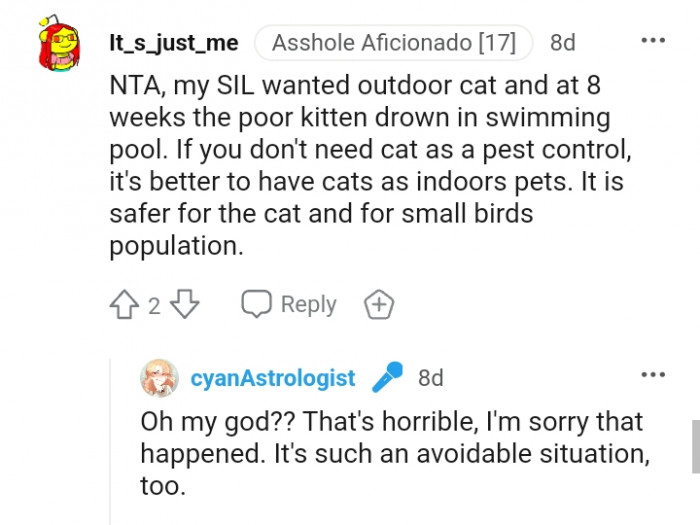
This Redditor would have freaked out as well if this happened to their cat
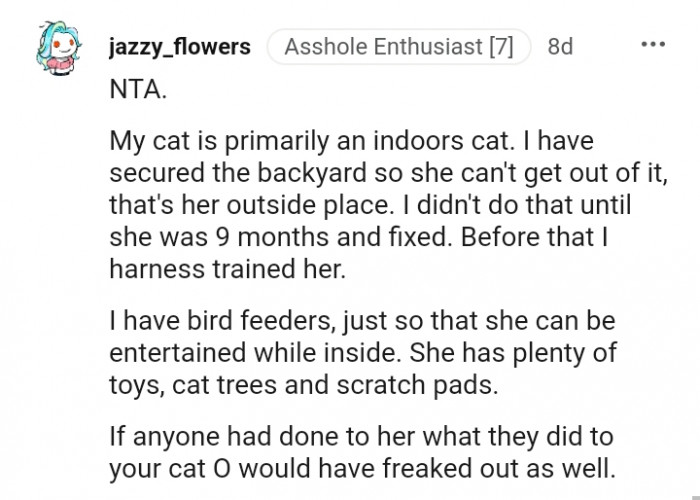
It’s one thing to argue, but it’s a whole other thing to be totally clueless. The OP’s cousin could have just done some research, but no, he wants to be ignorant.
Good for the OP for standing her ground and voicing her opinion. We do hope she takes precautions to stop this from happening again.
Do leave your thoughts in the comments below.
Psychological Analysis
This situation highlights the challenges of balancing emotional attachments to pets with the responsibilities that come with pet ownership. It's essential for individuals to communicate openly about their concerns and educate themselves on the broader implications of their choices. Promoting responsible pet care can lead to better outcomes for both pets and the environment.
Analysis generated by AI
Analysis & Alternative Approaches
In summary, navigating the complexities of pet care requires an understanding of both emotional investment and environmental responsibility. Research underscores the importance of effective communication and community engagement in promoting responsible pet ownership. By fostering awareness and encouraging dialogue, individuals can create a more harmonious environment for pets and the ecosystems they inhabit.
Analysis & Alternative Approaches
In conclusion, navigating breaches of trust and responsibility in relationships requires empathy, effective communication, and a commitment to establishing clear boundaries. Recognizing the emotional dynamics at play can help individuals address conflicts constructively and foster stronger connections. By promoting open dialogue and understanding, families can create supportive environments that prioritize trust and mutual respect.



